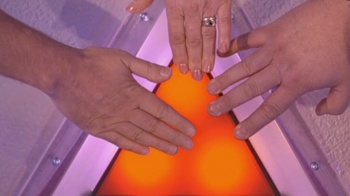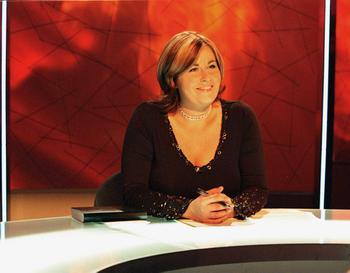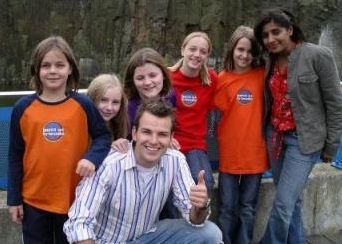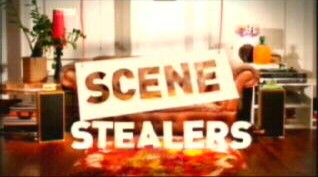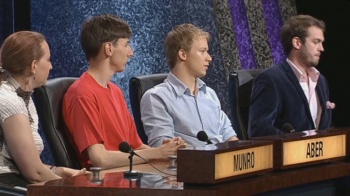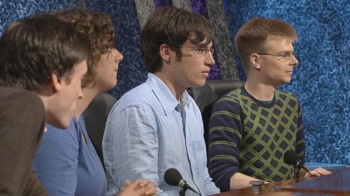Weaver's Week 2009-10-18
Last week | Weaver's Week Index | Next week
Contents |
Who should be voted off the team?
Weaver's Decade: Part 1: But we don't want to give you that! | Part 2: Who should be voted off the team? | Part 3: Big Brother House, this is Davina | Part 4: Singing for Survival | Part 5: the rest of the best | Part 6: failures and interactivity
| The Weakest Link (2000 – present) is almost an entirely traditional quiz. A no-nonsense questionmaster asks trivia of the contestants, money is banked for correct answers and lost for wrong answers, contestants are gradually eliminated, and the winner takes home the day's prize. The format introduced three novelties that would become standard fare.
The money chain wasn't so new, but there were innovations here: rather than Millionaire's practice of doubling the prize after every correct answer, Link's values flattened off as they converged to the target, initially doubling, but later increasing by 1.5 times, and eventually 1.25 times. No, the novelty was that the contestants were responsible for their own prize. They had to call to bank the prize in the fund, it wouldn't be done for them, with the proviso that an incorrect response would empty the fund. The second novelty was that the host was deliberately aggressive, upending the tradition of jolly hosts (in the style of Bob Monkhouse and Bruce Forsyth) or tough-but-fair inquisitors (Magnus Magnusson, William G. Stewart). The only other host who had regularly derided the participants was Humphrey Lyttelton. Anne Robinson would verbally attack the contestants, pointing out their flaws and hoping to make them feel more uncomfortable in the studio. The psychological effect is to remind everyone that she's in charge, she's the queen bee, and anyone trying to take her place will be stung. | |
| The final new idea was that contestants were responsible for eliminating one of their number. The Weakest Link rejected Fifteen-to-One's mechanical idea of "three lives", or the "last wrong answer loses" concept that would be used on many other shows. Instead, social disapproval was used to remove players – votes were cast and counted, and one player removed after each ballot.
Not a novelty, but certainly ubiquitous, was the penalty shoot-out as applied to quizzes. Player A is asked a question, Player B is asked a question, and whoever leads after both have had five questions wins; sudden-death to break ties. This idea has appeared on many quiz programmes in the past decade, and swiftly transformed from "interesting idea" to "a bit of a cliché" to "oh can't they find something even slightly original". The Weakest Link would prove to be very interesting to academic researchers – mathematicians would demonstrate that the best places to bank were at £20, £200, and £1000, and psychologists would consider the effect of signalling and concealement of actual knowledge to avoid being voted off late in the show. It also proved appealing to viewers; Robinson's catchphrase of "You are the weakest link, goodbye" was used in political protests barely a month after Link took to the air. Within three months, Link had graduated to primetime BBC1, and was taking repeats on BBC Choice. It was sold around the world, with 98 broadcasters expressing interest by 2005. It was the biggest success of the genre we'll be examining in this second part of the review of the decade: shows that looked at the player both as part of a team, and as an individual in their own right. |
|
| Link wasn't the first team quiz to take to the air – BBC1 had already run The Syndicate (2000), a captain-and-team affair that had a surprisingly large amount of tactical play, and was capable of wild swings in a short time. The Syndicate introduced the debrief over the end credits – it's also become a standard part of television grammar this decade – and is perhaps worthy of a revival somewhere. Not until Postcode Challenge (2007-8) would there be another team quiz where the captain had great responsibility.
The Weakest Link was by far the most influential quiz, but its novelties were initially misinterpreted. The obvious point of difference was that Anne was nasty towards the contestants, adding to the psychological pressure of being in a television studio with a bunch of strangers. Many producers thought, "ah! Anne's nasty, so we'll hire someone to be nasty at our contestants." That led to Dog Eat Dog (2001-2), with Ulrika Jonsson being unnaturally snarly at her contestants for reasons that were never adequately explored. It led to King of the Castle (2001), with Alistair Stewart shouting at his contestants for no reason at all. It led to the big money bad feeling programmes Greed and Shafted, which ultimately begat Golden Balls, but we've already covered those. And it reached its apotheosis in the abysmal Distraction (2003-4), where the odious Jimmy Carr thought it funny to commit wanton acts of vandalism. As a review in The Guardian this week noted, bad taste is a legitimate weapon in a comic's arsenal, but Carr deploys it like a bludgeon, with no subtlety. The real influence of Link was the elegant way it demonstrated how people could work: as a team, shedding the least useful members, then the most useful members, until someone near but not at the top won the prize. Over in Jersey, detailed plans were coming to fruition. The Mole (2001) would take ten people offshore, and ask them to complete certain challenges as a team. Except they weren't working as a team, one of their number was quite deliberately and overtly sabotaging the team's efforts. At the end of each episode, there was a quiz on what the mole had been doing over the past few days, and the worst score was eliminated from the game. The best performance in the final exam scooped the pot everyone had been working towards. |
|
| Like Link, The Mole gently subverted the traditional view of "the team" as a unified body of people working for a common objective, replacing it with a looser set of alliances, gently shifting over time. While Link discarded the player deemed worst in a subjective measure, The Mole removed the worst player from an objective metric. The Mole was more traditionally structured – the producers determined which prizes would be offered, and how hard their man would try to stop the team from winning. It benefitted from the sheer spectacle – every episode contained something worth talking about, be it Sara and Olly in the ma(i)ze or Tanya's "sprained" ankle. Only two series were made, Channel 5 decided to take the series out of commission in the first of its all-too-regular changes of schedule. Throwing the baby out with the bathwater, that's Channel 5.
The Mole directly inspired other cuckoo-in-the-nest shows. The Enemy Within (2002) was almost a direct copy, if one can equate stand-up rows in Kelowna High School with sit-down questions asked by Nigel Lythgoe. Dirty Rotten Cheater appeared stateside in 2003, when it still captured the zeitgeist; by the time it came to BBC1 (2007), fashion had moved on and the show looked like a relic from a bygone era. Both shows had one contestant who was fed all the answers, and the others had to spot them. Divided (2009 – present) took another of The Weakest Link's innovations and ran further. Here, contestants themselves are responsible for determining whether to stop and split the money, or to play on and win some more. The players, not the producers, make that decision. Most of the show is about the team working together, but then they must carve up the pot in unequal segments – they must decide amongst themselves who has been the strongest link and who the weakest. | |
| Divided owes some of its success to Beg, Borrow or Steal (2004), the best show to appear in BBC2's 6pm slot, combining a general knowledge quiz with social negotiation and bluff and double-bluff. It only lasted one season, and the slot was ultimately won by Eggheads (2003 – present). What's the attraction of Eggheads? A question we've been pondering since it began, but it's clear that there's a strategy available for success: knowing your enemy and being able to predict their moves. Some eggheads are good at sport, some are atrocious at it. Some know their religion, others have a blind spot there. Good teams will eke out these chinks in the armour. Great teams will be eased out by the producers and not allowed to compete.
But back to the negotiation and bluff and double-bluff we mentioned, concentrating more on the individual than the team. There was a fruitful run of psychological games in the first half of the decade. It began with Trust Me (2000), the prisoner's dilemma hosted by Nick Bateman from that year's Big Brother (and we'll discuss that in two weeks.) BBC2's experimental series Traitor (2004) combined this psychology with a spot-the-imposter game not too far removed from The Mole. Judgemental (2002-3) and Without Prejudice? (2003-4) invited people to make snap judgements on their fellow man. Judgemental had a quiz game grafted on. Without Prejudice? awarded one of the people being judged a large amount of money, purely so that the contestants' minds could be concentrated and they would take it seriously. Yes, we insist the contestants on Without Prejudice? were the people doing the judging, not the ones winning the money. | |
| After a few years off, psychology returned in 2008 with the mental agility shows Brainbox Challenge and Brain-Jitsu. Beneath the bluster, Clever v Stupid (2009) is an attempt to discuss different theories and aspects of intelligence, and producers have warned us that there will be more mental agility shows in the coming months – a sponsored series has already been recorded for Channel 5. If it's good, it'll be axed quickly, the fate of pure psychology game Double Cross (2003).
One of the hidden aspects of Weakest Link is that contestants are expected to predict how their opponents will fare in the future, based on what they've seen so far. Eggheads adopts a similar strategy. But what of games where contestants are expected to pick how members of their team will cope? The Waiting Game (2001-2) is the classic example of this: here, players buzzed in with the hope that their fellow player might answer the question and win the point. Friends Like These (1999-2003) invited teams of five to select their best player at a broad category, in the hope that they might win a holiday; a twist at the end invited the successful friends to gamble their prize in the hope that they could all go. Even by 2000's standards, such altruism was rare on primetime television, where the standard was far more adversarial and gladiatorial. Children's television tapped into that feelgood vein with the phenomenally successful Best of Friends (2004-8), where children took control of their own prizes, deciding for themselves who would have little treats and who would have to work for their prizes. Knowledge of friends helped make Stake Out (2008) into another show to warm the cockles. | |
| Being able to predict the average person's responses had been the selling point of Family Fortunes (1980 – present) for two decades; the show didn't quite work in daytime (2002) and has only been played by celebrities in the more recent primetime series (2006 – present). For our money, that misses the point, the show is about ordinary people showing their ordinariness. Its place has been taken by Who Dares Wins (2007 – present) and the daytime success Pointless (2009 – present), both of which challenge couples to demonstrate they're smarter than the average person. The first series of Panic Attack (2008 – present) pursued a similar line, but it changed to standard quiz questions in the recent run.
Very few shows have tried to address the greater questions. Link was happy to confine its scope to the ten people in the quizzing room. The Mole went no further than the ten contestants. Even Without Prejudice? was able to explore and challenge stereotypes only indirectly, by addressing and questioning the contestants' reactions to the people shown them. Our hats go off to Scene Stealers (2008), which demonstrated the fragile nature of social stereotypes to an audience of teenagers by plucking people from one subculture, and asking them to pass off as a member of a completely different subculture after a weekend's immersion therapy. Here, the players thought of themselves as being on one team, but were helped to transfer to an entirely different team, before being judged as individuals on how well they'd moved over. Heady stuff, and it deserved better than the BBC Switch graveyard. |
In part three, we explore some entirely self-contained universes. "Big Brother house, this is Davina" follows in two weeks.
University Challenge
Heat 14: Emmanuel Cambridge v Regent's Park Oxford
| Though the quizzing will continue until next Easter, we've now met the winners. Once. 160 points will bring back any side, winning will prove more useful in the long run.
The first question is on Jane Austen, and it's picked up by Regent's Park Oxford. Who? It's a Baptist college, which took its name from its site near the park in north London where it spent the second half of the 19th century, before moving to Oxford in 1927. According to Thumper, the college always does well in the Oxford tortoise race. Emmanuel Cambridge come in with the third starter, on the logo of an unreliably unreliable other wiki. The college is somewhat older, having been founded in 1584 by Mildmay, a finance minister for Good Queen Bess. Alumni include the author Sebastian Faulks and the comedian Graham Chapman. The first visual round also goes to the Cambridge side, and they lead 55-30. Regent's Park draw level with a set of bonuses on Napoleon III, including knowledge that Hausmann replanned Paris. Potential Millionaire contestants, do take note. Ahem. The only Scotsman on the panel knows the Scottish rugby anthem, which allows the Oxford side to all have a starter. Emmanuel come close to drawing the game level, but as the audio round (guitar solos) goes to Regent's Park, they lead 110-90. | |
| That 155 of UCLAN is beginning to look rather fragile all of a sudden, both sides are scoring at a decent rate. Emmanuel draw level with bonuses on geographical corridors, but Regent's Park pull ahead again with a very fast starter on the works of Locke. The second visual round is on depictions of Dickens' work, and Regent's Park stretch their lead to 145-110.
Is there a word for people in their twenties? Vicenarian? We learn something new every week. "We don't have any scientists here", claims the Regent's Park captain. It's true, two linguists, a historian, and a philosopher do not a balanced team make. Even by his lenient standard of this series, Thumper is tremendously generous to give one starter to Emmanuel after the contestant takes a tremendous pause before giving the answer, and the side takes full advantage of the bonuses. Regent's Park secure the 160 they need to come back. Emmanuel suffer from guessing at a poet who quoted lots of shipping forecast areas when the question asked after that poet. One more starter might see Emmanuel in the repechage, but Regent's Park have had by far the better set of buzzers. A very harsh decision costs Regent's Park five – it's on the portmanteau word "Butskillism", Regent's Park give both names, a late swerve asks for the Labour leader only, and it's picked up by Emmanuel, who take all three bonuses. We thought they were above such concealed trickery these days, and note the same question stem appeared on this week's Brain of Britain, seeking both names. Another starter gives Emmanuel the score they need: though Regent's Park have won 205-165, Emmanuel will return in the repechage. | |
| "You were good enough to come back," says the host to Emmanuel. That's eminently debatable. Emmanuel had the rub of the green on two occasions, and profited to the full from these dubious bounces. Still, what's done is done, and when they did get to play, Emmanuel were very good, 18/27 on the bonuses with Alex Guttenplan getting six starters. The side picked up three missignals. Regent's Park had 16/42 bonuses, again with three missignals, James Aber was right on eight starters. The overall accuracy rate was 57/95.
The automatic qualifiers for the second round are: Manchester, King's London, Imperial College, Warwick, Loughborough, St George's London, Jesus Oxford, St John's Oxford, St Hugh's Oxford, Regent's Park Oxford, Girton Cambridge, Newnham Cambridge, Edinburgh, St Andrews. Of these, St John's had the highest score (270), Newnham had 260, and St Andrews 255. All three must be favoured to progress, presuming they avoid each other. We're also going to be watching for Warwick, who were impressive in their opening match, and UCL, who we reckon are a cut above the other sides in the repechage. Next match: UCL v Clare Cambridge. So that'll be a win for Clare, knowing our prediction record. | Final repechage standings:
|
This Week And Next
We didn't see it ourselves, but apparently last week's edition of Simon Cowell Annoys was enlivened by Kylie Minogue's Sister jemmying in some heteronormative abuse. Was she trying to steal the headlines in the following day's papers? Was she trying to be more offensive than Strictly's Anton du Beke, who had called his dancing partner a "paki" and apologised in consecutive breaths. Kylie Minogue's Sister found the crowd reaction was not what she expected, a heartfelt "meh". By their silence, the public asserted that a performer's sexual preferences (straight, gay, both, or neither) has absolutely no bearing on their ability to perform, and Kylie Minogue's Sister would do well to remember that. There's no better memorial to Stephen Gately, the first boy in a band to come out as gay, who had died earlier that day. Mr. Gately had competed to great effect on a series of Dancing on Ice, and has been suggested for next year's Celebrity Big Brother: The Finale.
We also regret to report the death of Patrick Hannan, the journalist and broadcaster. Just two weeks ago we were raising a metaphorical glass to Mr. Hannan and Peter Stead, as the Wales team won Round Britain Quiz.
We also regret to report the death of Ian Wallace, the singer, actor, and broadcaster. His opera career spanned two decades, and he made the television explanations of opera Singing For Your Supper (STV, 1967-70), a direct inspiration for Harry Enfield's Guide to Opera (C4, 1993). It's as a regular panellist on My Music that Mr. Wallace crosses this column's radar; he'll be best-remembered for singing a song about a hippopotamus to children of all ages.
BARB ratings for the week to 4 October, and a pattern is set. Simon Cowell Annoys, a year-best 13.35m. Strictly, a year-best 9.05m. Family Fortunes, 5.6m. The Cube, 4.7m for the last in the series. Millionaire had 3.45m, just ahead of Masterchef The Professionals (3.3m on Thursday, its best for the year) and University Challenge (3.2m) – all three of these shows were part-networked. Dancing on Two peaked with 2.3m on Wednesday, and Mastermind's becoming popular as the anti-Eastenders, 2.2m saw the show. Buzzcocks also had its largest audience of the year, 2.05m.
Interesting to note that ITV2's More Annoyance show had more viewers on Sunday (1.255m) than Saturday (950,000); the main show's Sunday repeat was seen by 1.05m. Come Dine With Me retained third place, on 940,000. Hell's Kitchen Us was seen by 450,000, roughly level with Dave's Monday schedule; and Restaurant In Our Living Room by 220,000, on a par with CBBC's Da Dick and Dom Dairies. On UK Living, America's Next Top Model had a year-high 450,000, and UK Watch TV showed Ballroom With the B-List to 210,000 viewers.
Next week, the Week expects to review Design for Life. That finishes on Monday (BBC2, 9.15), and there's competitive farming on Fferm Ffactor (S4C, 8.25 Tuesday). The obvious choice for post-pub easy viewing is a rerun of Only Connect (BBC4, 11.55 Friday). Next Saturday's times shouldn't be affected by sport over-running: Strictly at 7pm, Simon Cowell at 8.

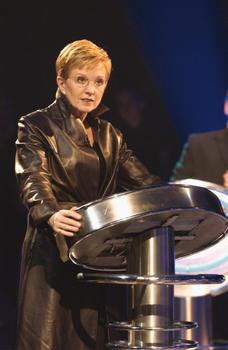
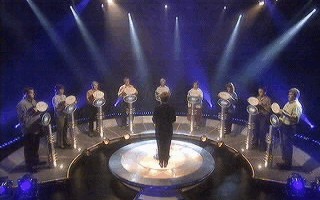 Rejected name: The hemicycle of horror
Rejected name: The hemicycle of horror
 Try harder, everyone. Must observe least effort.
Try harder, everyone. Must observe least effort.
